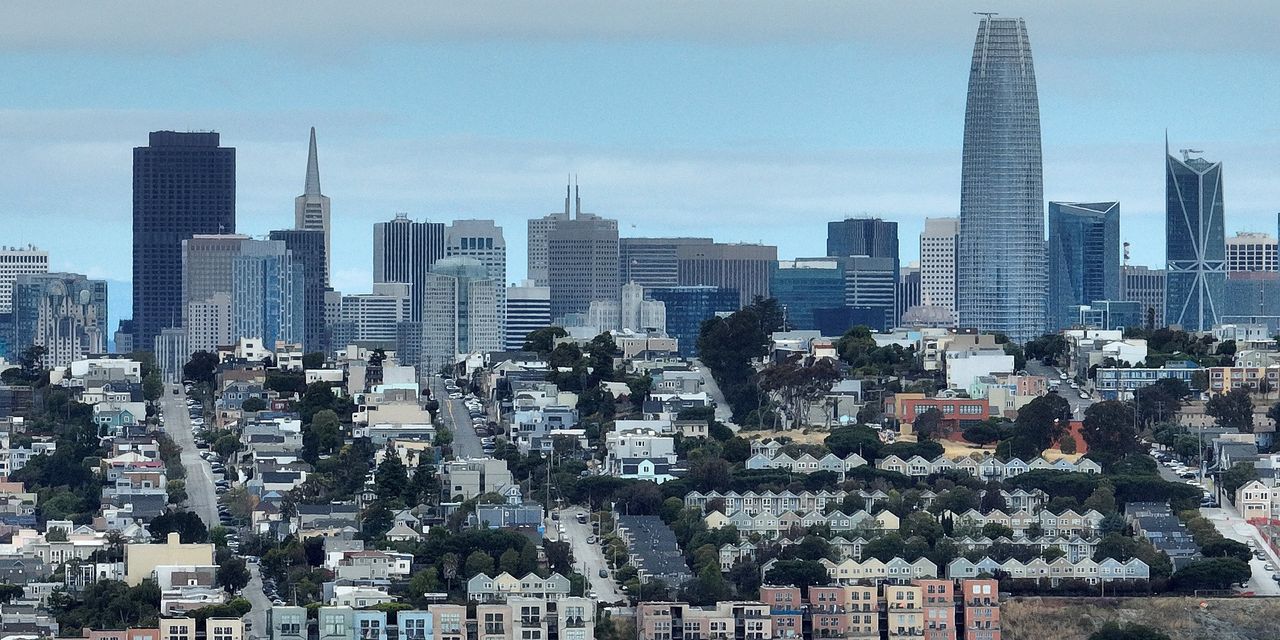San Francisco’s reeling commercial real-estate market remains at risk of more falling “dominoes,” according to Moody’s Analytics.
Owners of San Francisco’s largest mall and two of its biggest hotels in June walked away from mortgages on their properties, putting the spotlight on a mountain of debt coming due in the city on office properties, where vacancy rates are at record highs and recent distressed sales paint a grim picture.
A key concern is that “the city is in a bit of a snowball situation which is placing its needed critical mass in question,” a Moody’s Analytics team led by Thomas LaSalvia, head of commercial real estate economics, wrote in a recent client note.
“Cities live and die by the critical mass, the question now becomes, how much further does San Francisco have before it loses its critical mass?”
The city has seen one of the weakest pandemic recoveries due to remote work, street-safety issues and other significant challenges, despite optimism around the potential for the A.I. boom to help lift its fortunes.
A rally in big tech shares has helped the S&P 500 index
SPX,
gain 14% so far this year and the Nasdaq Composite Index
COMP,
almost 30%, according to FactSet.
But the tech hub also faces more immediate concerns from property owners swimming in maturing debt, with credit more scarce and borrowing costs
TMUBMUSD10Y,
significantly higher than a year ago.
San Francisco has the fourth-largest outstanding balance of loans coming due through next year (see chart) in the commercial mortgage-backed securities market, where Wall Street creates, pools and packages loans on office buildings, hotels, shopping centers and other property types into bond deals.
The city also had a record 29.4% office vacancy rate as of the first quarter, according to CBRE.
Against that backdrop, maturing office loan in San Francisco face the “stark reality” of refinancing risks, but also expiring leases that threaten to further drag on low ratios of property income to debt, the Moody’s Analytics team said.
Listen: What happens if people stop going to the office?
Office buildings have been in the eye of the storm as flexible work arrangements collide with the end of cheap debt, but San Francisco’s troubles don’t stop there.
Westfield said in mid-June that it would be surrendering its namesake shopping center in the city to lenders after more than 20 years of operation, due to a 43% drop in foot traffic since 2019 and other “challenging operating conditions in downtown San Francisco.”
Earlier in June, owners of the Hilton San Francisco Union Square and Parc 55 San Francisco said they stopped making payments on $725 million loan backing the properties due to record high office vacancies, concerns over street conditions and other challenges could dampen business and leisure activity “for the foreseeable future” in the city.
Overall, San Francisco’s landlords took out slightly more than $22 billion of property loans in the commercial mortgage-backed securities market in recent years, roughly half on office buildings, leaving only New York and Los Angeles with bigger footprints in the sector, according to Fitch Ratings.
Also: Landlords, a recession could make your office property woes worse, not better
Read the full article here





